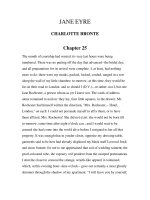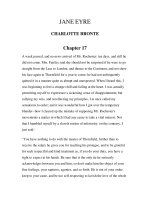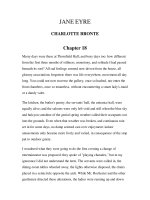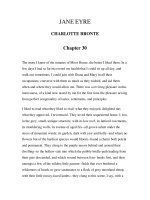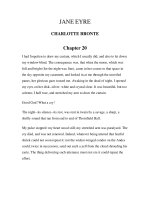Jane eyre
Bạn đang xem bản rút gọn của tài liệu. Xem và tải ngay bản đầy đủ của tài liệu tại đây (2.06 MB, 73 trang )
MACMILLAN READERS
BEGINNER LEVEL
CHARLOTTE BRONTE
Jane Eyre
Retold by Florence Bell
MACMILLAN
MACMILLAN READERS
BEGINNER LEVEL
Founding Editor: John Milne
The Macmillan Readers provide a choice of enjoyable reading
materials for learners of English. The series is published at six
levels — Starter, Beginner, Elementary, Pre-intermediate,
Intermediate and Upper.
Level control
Information, structure and vocabulary are controlled to suit the
students' ability at each level.
The number of words at each level:
Starter about 300 basic words
Beginner about 600 basic words
Elementary about 1100 basic words
Pre-intermediate about 1400 basic words
Intermediate about 1600 basic words
Upper about 2200 basic words
Vocabulary
Some difficult words and phrases in this book are important for
understanding the story. Some of these words are explained in the
story and some are shown in the pictures. From Pre-intermediate
level upwards, words are marked with a number like this: 3.
These words are explained in the Glossary at the end of the book.
Contents
A Note About the Author 4
A Note About This Story 6
The People in This Story 7
1 My Story Begins 8
122 Lowood School
163 Thornfield Hall
204 Mr. Rochester
265 Fire!
316 Guests at Thornfield Hall
357 A Terrible Night
418 In the Garden
9 Mr. Rochester's Wife 46
5410 Moor House
5911 My Story Ends
A Note About the Author
Charlotte Bronte was born on 21st
April 1816. She lived in the village
of Haworth, in West Yorkshire, in
the north of England. Her father was
a clergyman. He worked in the
church at Haworth.
Charlotte had four sisters. They
were Maria, Elizabeth, Emily and
Anne. Charlotte had one brother -
Branwell. Charlotte was not pretty and her eyes were weak. But
Charlotte was clever and she had a strong character.
In 1824, Maria, Elizabeth, Charlotte and Emily were pupils at a
school called Cowan Bridge. The school was fifty miles from
Haworth. It was a bad school and many of the children became
sick. In 1825, Maria and Elizabeth died. Charlotte and Emily went
home. From 1825 to 1831, Charlotte's father taught his children at
home.
In 1831, Charlotte was fifteen years old. She was a pupil at a
school called Roe Head. Later, she was a teacher at this school.
In 1842, Charlotte and Emily studied in Brussels in Belgium.
Charlotte was a clever student. But she was unhappy. She fell in
love with a married man. And she returned to England.
Charlotte, Emily, Anne and Branwell wrote stories and they
drew pictures. They also wrote poetry. Branwell was going to be
an artist. But he became ill. He drank alcohol and he took drugs.
The Bronte sisters sent their stories to a publisher. In the 1850s,
women's stories were not often published. So Charlotte wrote her
books with the name, Currer Bell. Emily wrote Wuthering Heights
with the name, Ellis Bell. And Anne wrote Agnes Grey with the
name, Acton Bell. Their books were very popular. Soon people
wanted to meet these authors. Then they were surprised. These
good writers were women!
Charlotte Bronte's novels are: The Professor, Jane Eyre
(1847), Shirley (1849) and Vilette (1853). Jane Eyre is one of the
most popular stories in English. In 1847, people read Jane Eyre
and they were surprised. Women did not often speak about their
hopes and their thoughts. Women did not talk to men in this way!
In 1848, Emily and Branwell died. Anne died the next year.
Charlotte lived with her old father. She was now a famous author.
People wanted to meet her. Charlotte travelled to London and she
met poets, artists and writers. She visited theatres, museums and
art galleries. In 1854, Charlotte married a clergyman, Arthur
Nicholls. On 31st March 1855, Charlotte Bronte died. She was 38
years old.
A Note About This Story
Time: The 1830s. Place: The north of England.
Early in the nineteenth century, there were no cars or trains.
People rode horses. People travelled in coaches or in carriages
pulled by horses. Journeys were long and difficult. Most people
lived in the countryside. Rich people had large houses and many
servants.
Rich children learnt their lessons in their homes. A teacher
lived in their house. Some poor children lived at their schools.
Some of these schools were very bad. The buildings were cold and
uncomfortable. These children did not have enough food. Their
teachers often beat them.
The Brontes were poor. The three sisters worked as
governesses. Governesses lived in the homes of rich families. They
taught the children of these families.
In the story, Jane Eyre, Charlotte Bronte wrote about her own
life. Jane was unhappy in a bad school. Charlotte was unhappy too.
Jane Eyre was not pretty. But she was clever and she was good.
Charlotte was not pretty. But she was intelligent and she worked
hard. In the story, Jane Eyre becomes a governess. Charlotte was a
governess in the homes of two rich families. She hated the work.
In 1851, there were about 25000 governesses in England.
Many poor women from good families worked as governesses.
They were not married. Governesses were not paid well.
The People in This Story
My Story Begins
In 1825, I was ten years old. My father and mother were dead. I
lived with my aunt and uncle, Mr. and Mr.s Reed. Their house
was called Gateshead Hall. The house was in Yorkshire, in the
north of England. My Aunt and Uncle Reed had two children - a
boy, John, and a girl, Eliza.
I liked my Uncle Reed and he liked me. But in 1825, my
uncle died. After that, I was very unhappy. My Aunt Reed did
not like me. And John and Eliza were unkind to me.
It was a cold, rainy day in December. All of us were in the
house. I wanted to be alone. I wanted to read. I opened a book.
Then I heard my Cousin John's voice.
'Jane! Jane Eyre! Where are you?' John shouted. He came
into the room and he saw me.
'Why are you reading my book?' he asked. 'Give it to me!'
John took the book. He hit my head with it. I screamed. John
hit me again. I pulled his hair and I kicked him.
'Help! Help, Mamma!' John shouted. 'Jane Eyre is hurting me!'
Aunt Reed ran into the room. She pulled me away from John.
'John hit me with a book,' I said. 'I hate him. And I hate you
too!'
'You are a bad girl, Jane,' my aunt said. 'Why do you hate me?'
'You don't like me,' I replied. 'John and Eliza are unkind to me.
I want to leave Gateshead Hall.'
'You want to leave!' Aunt Reed said. 'Where will you go? Your
parents are dead. You cannot live alone.'
Aunt Reed thought for a moment.
'My friend, Mr. Brocklehurst, is the owner of a school,' she
said. 'I will send you to Mr. Brocklehurst's school.'
A few days later, Mr. Brocklehurst came to Gateshead Hall. He
was a very tall man. His eyes were dark and his face was cruel.
'Jane Eyre,' he said to me. 'God does not like bad children. God
punishes bad children, Jane Eyre.'
'God will punish John Reed,' I replied. 'John Reed hits me and
he shouts at me.'
'That is not true. You are a liar, Jane Eyre,' Mr. Brocklehurst
said. 'You must not tell lies. And you must not live here with your
cousins. You will come to Lowood School. You will become a
good girl.'
'I want to come to your school, sir,' I said. 'I want to leave this
house.'
'Bad girls are punished at my school, Jane Eyre,' Mr.
Brocklehurst said. 'The girls work very hard at Lowood.'
'I will work hard. I will be a good pupil, Mr. Brocklehurst,' I
said.
Two weeks later, I left Gateshead Hall. I went to Lowood School.
Lowood School
It was the month of January. I arrived at Lowood School at night.
A servant took me up some stairs and into a big bedroom. There
were many beds in the room. The girls in the beds were asleep.
The servant took me to an empty bed. 1 put on my nightclothes
and I got into bed. Soon, 1 was asleep too.
I woke up very early. A loud bell was ringing. The bedroom was
dark and cold. I watched the other girls. They washed in cold
water and they dressed quickly.
There was a plain brown dress next to my bed. And there was a
pair of ugly, heavy shoes. I washed quickly. Then I put on my new
clothes.
I was very hungry. I followed the other girls down the stairs.
We sat down at long tables in a large dining-room. Our food was
terrible.
'The food is bad again,' one of the girls said.
'Stand up!' a teacher shouted. 'Don't talk!'
We stood up. We did not speak. We walked into a big
schoolroom and we sat down.
There were about eighty girls in the schoolroom. And there
were four classes. The oldest girls were in the fourth class. I was in
the first class.
Four teachers came into the room and we began our lessons.
The lessons were not interesting. First, we read some pages in a
book. Then our teacher asked us questions about those pages.
After four hours, we went outside. It was very cold. Very soon,
a bell rang. Lessons started again.
Three weeks passed. One afternoon, the head teacher came into the
schoolroom. The head teacher's name was Miss Temple. Mr.
Brocklehurst was with her. We all stood up. I stood behind an
older girl. I did not want Mr. Brocklehurst to see me.
Mr. Brocklehurst walked slowly round the room. Everybody
was very quiet. And then I dropped my book!
Mr. Brocklehurst stopped walking. He looked at me.
'Ah! The new girl,' he said. 'Come here, Jane Eyre!' Then he
pointed at two of the older girls. 'You two girls — put Jane Eyre
on that high chair!' he said.
'Look at Jane Eyre, everybody!' Mr. Brocklehurst
said. 'This child is bad. She is a liar. She will be
punished! Miss Temple! Teachers! Girls! Do not talk
to this child.'
Then he spoke to me again.
'Jane Eyre, you must stand on that chair for two
hours,' he said. 'You are a bad girl!'
That evening, I cried and cried. But Miss Temple
was kind to me.
'You are a good pupil, Jane,' she said. 'And you
are not a bad girl. I am your friend, Jane.'
'Thank you, Miss Temple,' I said.
Lowood School was in an unhealthy place. The buildings were wet
and cold. Mr. Brocklehurst owned the school. He was a rich man.
But he did not buy warm clothes for us. And he did not buy good
food for us. Everybody hated him.
In the spring, many of the girls became sick. Some of them left
the school. They never came back. Many of the girls died.
That spring was a terrible time. We had no lessons. Miss
Temple and the other teachers took care of the
sick pupils. Mr. Brocklehurst had to buy better food for us. And he
had to buy warm clothes for us. Mr. Brocklehurst never came to
the school.
The next year, Lowood School moved to a better place. It was a
healthier place. There were new schoolrooms, new bedrooms and a
new dining-room. The new buildings were bright and clean. The
teachers were happy. After that, I was happy at Lowood School
too.
I was a pupil at Lowood School for six years. Then I became a
teacher. I was a teacher at the school for two years. But I never
returned to Gateshead Hall. And the Reeds never wrote to me.
Thornfield Hall
In 1833, I was eighteen years old. In the summer, Miss Temple left
Lowood School. She got married. I wanted to leave Lowood too. I
wanted a new life.
'I will be a governess,' I thought.
I put an advertisement in a newspaper.
I had a reply to my advertisement. The reply was from Mr.s
Fairfax of Thornfield Hall, near Millcote. Millcote was about
seventy miles from Lowood School. Mr.s Fairfax wanted a
governess for a little girl.
I wrote to Mr.s Fairfax immediately. I was going to be a
governess at Thornfield Hall!
I travelled to Millcote in a coach. At Millcote, a servant met
me. He took me to Thornfield Hall. At Thornfield Hall, another
servant opened the door. She was smiling. She took me into a
small, warm room. A lady was in the room. She was sitting by the
fire.
'Are you Mr.s Fairfax?' I asked her.
'Yes, my dear,' she said. 'And you are Miss Eyre. Are you
cold? Sit by the fire, Miss Eyre, A servant will bring you some
food.'
'Mr.s Fairfax is very kind,' I said to myself. 'I will be happy
here.'
'Will 1 see Miss Fairfax tonight?' I asked.
Mr.s Fairfax looked at me. She smiled.
'Miss Fairfax? No, no,' she said. 'Your pupil's name is not Miss
Fairfax. Your pupil is Adele Varens. Adele's mother was a
Frenchwoman. Adele is Mr. Rochester's ward. He takes care of
her.'
'Mr. Rochester? Who is Mr. Rochester?' I asked.
'Mr. Edward Rochester is the owner of Thornfield Hall,' Mr.s
Fairfax said. 'I am his housekeeper. I take care of Thornfield Hall.
Mr. Rochester is not here now. He does not like this house. He is
often away from home.'
I was very tired. Mr.s Fairfax took me up the wide stairs. She
took me to my room. I went to bed immediately. And I slept well.
The next morning, I woke early. The sun was shining. I put on a
plain black dress. I opened my bedroom door. I walked along a
corridor and down the wide stairs. I walked out into the sunny
garden.
I turned and I looked up at my new home. Thornfield Hall was
a beautiful house with many large windows. The garden was
beautiful too.
After a few minutes, Mr.s Fairfax came into the garden. She
spoke to me.
'Good morning, Miss Eyre,' she said. 'You have woken early.
Miss Adele is here. After breakfast, you must take her to the
schoolroom. She must begin her lessons.'
A pretty little girl walked towards me. She was about eight
years old. She spoke to me in French and I replied in French.
After breakfast, I took Adele to the schoolroom. We worked all
morning. Adele enjoyed her lessons and I was happy.
In the afternoon, Mr.s Fairfax took me into all the rooms of
Thornfield Hall. We looked at the paintings and at the beautiful
furniture. We walked along the corridors,
'Come up onto the roof, Miss Eyre,' Mr.s Fairfax said. 'You
will see the beautiful countryside around Thornfield Hall.'
We walked up many stairs. At last, we were at the top of the
house. We walked along the top corridor. Mr.s Fairfax opened a
small door and we walked onto the roof.
'Look, Miss Eyre,' Mr.s Fairfax said. 'You can see for many
miles.'
We stood on the roof for a few minutes. Then we went back
into the house. We walked carefully towards the stairs. The top
corridor was narrow and dark.
Suddenly, I heard a strange laugh.
'Who is that, Mr.s Fairfax?' I asked.
Mr.s Fairfax did not reply. She knocked on a door.
'Grace!' she said. The door opened. Behind the door was a
small room. A servant was standing at the door.
'Be quiet, Grace, please,' Mr.s Fairfax said.
The woman looked at Mr.s Fairfax. Then she closed the door.
'That was Grace Poole,' Mr.s Fairfax said. 'She works up here.
Sometimes she laughs and talks with the other servants. Don't
worry about Grace. Please come downstairs now, Miss Eyre.'
Mr. Rochester
Three months passed. I had not met the owner of Thornfield Hall.
Mr. Rochester had not come home.
One January afternoon, I went out and I walked towards the
road. I was going to the village of Hay. I was going to post a letter
in the village. Hay was two miles from Thornfield Hall. The day
was fine but it was very cold. I walked quickly and soon I was near
the village.
Suddenly, a big black-and-white dog ran past me. A moment
later, a man on a black horse followed the dog.
Then, I heard an angry shout. The dog ran past me again. It was
barking loudly. I turned round. The horse had fallen on the icy
ground and the man had fallen from the horse. 1 walked towards
them.
'Can 1 help you, sir?' I asked.
'My horse fell. I've hurt my foot,' the man said.
The horse stood up. The man tried to stand up too. But he could
not stand. He fell onto the ground again.
The man was about thirty-five years old. He was not handsome
but he had a strong face. He had dark eyes and black hair. He was
not very tall but his body was powerful.
'I'll bring somebody from Thornfield Hall,' I said.
'Do you live at Thornfield?' the man asked.
'I am the governess,' I replied.
'Ah, yes. The governess,' the man said. 'Help me, please.'
The man stood up very slowly, and he put his hand on my
shoulder. He walked slowly towards his horse. I helped him. He
pulled himself onto the horse.
Thank you. Now go home quickly,' the man said. And he rode
away.
I walked on to the village and I posted my letter. Then I
returned to Thornfield Hall. Bright lights were shining in the big
house. I went inside.
A big black-and-white dog walked towards me. It came from
the dining-room. I had seen the dog before.
'Whose dog is that?' I asked a servant.
'It's Mr. Rochester's dog,' the servant replied. 'Mr. Rochester
has come home. But he has hurt his foot. His horse fell on some
ice.'
I smiled. The owner of Thornfield Hall had returned! But I did
not see Mr. Rochester again that day.
I saw Mr. Rochester the next day. He sent for me in the evening. I
put on a clean dress. I brushed my hair carefully.
Mr. Rochester was in the large sitting-room. He was sitting in a
big chair. His right foot was on a small chair. Mr.s Fairfax and
Adele were sitting with him.
'This is Miss Eyre, sir,' Mr.s Fairfax said.
Mr. Rochester looked at me. He did not smile.
'Sit by the fire, Miss Eyre,' he said. 'Where have you come
from?'
'From Lowood School,' I replied. 'I was there for eight years.'
'Eight years!' Mr. Rochester said. 'That is a long time! Who are
your parents?
1
'I have no parents, sir,' I answered. 'They are dead.'
'But where is your home, Miss Eyre?' Mr. Rochester asked.
'I have no home, sir. I have no family,' I said.
'Why did you come to Thornfield Hall?' Mr. Rochester asked.
'I wanted to leave Lowood, sir,' I replied. 'I put an
advertisement in a newspaper. Mr.s Fairfax replied to my
advertisement.'
'Yes, I did,' Mr.s Fairfax said. 'Miss Eyre is a good teacher, Mr.
Rochester.'
Mr. Rochester smiled for the first time.
'You are very young, Miss Eyre,' he said.
'I am eighteen, sir,' I replied.
Mr. Rochester smiled again. He did not ask me more questions.
After that evening, I did not see Mr. Rochester for a few days.
Then, one night, he sent for me again.
'Sit near me, Miss Eyre,' he said. 'Mr.s Fairfax will talk to
Adele.'
I sat down quietly, but I did not speak. The fire was very
bright. 1 saw Mr. Rochester's face clearly. I saw his
large, dark eyes. He was smiling. He was happy.
After a minute, Mr. Rochester spoke.
'Miss Eyre,' he said. 'You are looking at me very carefully. Am
I a handsome man?'
'No, sir,' I said.
'You speak the truth, Miss Eyre!' Mr. Rochester said. 'Look at
me again. Am I a kind man?'
'No, sir,' 1 said again. 'You are smiling now. But you are not
always kind.'
'That is true,' Mr. Rochester replied. 'I have had a difficult life.
I have met bad people. I have been a bad person myself. Now
Thornfield Hall is my home. But I hate this house. You are very
young, Miss Eyre. You
cannot understand me.'
'You are right. I don't understand you, sir,' I said. I stood up.

